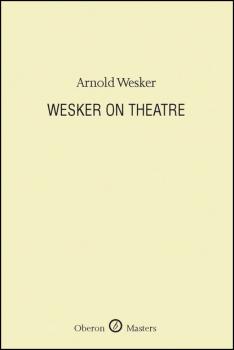Arnold Wesker
Список книг автора Arnold WeskerPolitical Plays
Includes the plays Chips With Everything, Their Very Own and Golden City, The Journalists, Badenheim 1939 and, published here for the first time, Phoenix Phoenix, Burning Bright.Described variously as ‘a dangerous playwright, ‘a melancholy optimist’, and ‘the unique outsider in the British Theatre’, Arnold Wesker is one of Britain’s most celebrated playwrights. This latest volume in Oberon Books’ Wesker series brings together five of his political plays. It features some of his best-known works including Chips With Everything, perhaps the most celebrated of his plays, and about which Harold Hobson, writing in The Sunday Times in 1961, said ‘this is the first play of which the Establishment need be afraid.’
The Kitchen
1950s London. In the kitchen of an enormous West End restaurant, the orders are piling up: a post-war feast of soup, fish, cutlets, omelettes and fruit flans.‘Fifteen hundred customers an’ half of them eating fish. I had to start work on a Friday.’Thrown together by their work, chefs, waitresses and porters from across Europe – English, Irish, German, Jewish – argue and flirt as they race to keep up. Peter, a high-spirited young cook, seems to thrive on the pressure. In between preparing dishes, he manages to strike up an affair with married waitress Monique, the whole time dreaming of a better life. But in the all-consuming clamour of the kitchen, nothing is far from the brink of collapse.‘We all said we wouldn’t last the day, but tell me – what is there a man can’t get used to?’Arnold Wesker’s extraordinary play premiered at the Royal Court in 1959 and has since been performed in over 30 countries. The Kitchen puts the workplace centre stage in a blackly funny and furious examination of life lived at breakneck speed, when work threatens to define who we are.
Groupie
Mattie Beancourt, a 61 year old woman, reads the autobiography of Mark Gorman, a famous painter. Having grown up in the same London East End streets as the painter she writes him a fan letter. He replies briefly, apologising he can't write at length as he's busy preparing for a new exhibition and must give interviews and meet with prospective purchasers, and so on. She is so surprised and impressed that he has deigned to reply that she dares write again. A correspondence develops. She visits him unannounced, and discovers that far from preparing for a new exhibition and being absorbed with interviews he lives in near poverty and neglect. Her personality is sunny, his is curmudgeonly. Their impact upon each other is startling. Groupie began life as a Radio 4 commissioned Friday Play which was transmitted in 2001 with Barbara Windsor and Timothy West. The world premiere opened in Naples 2002.
Wesker's Historical Plays
Presented here are four epic history plays from Sir Arnold Wesker, which touch on the age-old conflicts caused by religion, science and the Establishment.Set in the Jewish ghetto of Venice, 1563, Shylock (1972) is based on the same three stories from which Shakespeare wove his play, The Merchant of Venice . The core plot remains, but the relationships and characterisations are very different. Caritas (1980) is at once the story of a monastic young woman in the fourteenth century but also a metaphor for the wrong decisions which can imprison us for life. In 1144 a young boy was found brutally murdered in Thorpe Wood. The Jews were accused of slaughtering a Christian child to use his blood for Passover and mock the crucifixion. Blood Libel (1991) investigates a calumny which persists to this day. Meanwhile Longitude (2002) tells of the eighteenth-century race to accurately measure longitude – and claim a £20,000 reward from Parliament.
Wesker's Comedies
In The Wedding Feast an idealistic, altruistic shoe manufacturer arrives at an employee’s wedding, with disastrous consequences. One More Ride on the Merry-Go-Round features a comic plot involving academics who get high on a hash birthday cake, a recalcitrant daughter, and the appearance of an illegitimate son who is a magician. In Groupie 61-year-old Mattie Beancourt is shocked to discover her idol, the famous painter Mark Gorman, living alone in near poverty. She is sunny, he is curmudgeonly and the impact of their friendship is startling. Set against a scene of defiant old age, The Old Ones examines the eccentric rituals of old age and plays out the conflict between the optimistic and pessimistic spirit.
Wesker's Domestic Plays
In The Friends (1970), Esther is diagnosed with leukaemia, causing her friends to reassess their working-class identity, their imagined achievements as well as their own mortality. Bluey (1993) is a play about repressed memory resurfacing and three imagined futures that the protagonist cannot muster the courage to confront. In Men Die Women Survive (1990) a trio of estranged wives gather around the dinner table. As they conduct a post-mortem on their failed relationships a tale of betrayal and revenge emerges. Telling the story of a 44-year-old actress Gertie and her influence on Sam, a black teenager working as a car-park attendant, Wild Spring (1992) explores acting as a metaphor for the false images of ourselves with which we fall in love.
Joy and Tyranny
‘My preoccupation,’ says Arnold Wesker in his interview/portrait Ambivalences (published by Oberon Books) ‘with-violence-stemming from-perceived-intimidation-by-the-bright-ones who dare to be clever or simply different, began with an incident at school. While queuing for a school meal, one of the other boys wanted me to try his liquorice stick .I didn’t want to. This other pupil insisted. I continued to decline. I didn’t like liquorice! That I didn’t want to share what he liked, what he thought was good, enraged the other boy who couldn’t bear my indifference to his taste, and he hit me. I’ve never lost this image of violence induced by the outsider, the one who dissents, the one who doesn’t share in what others like or believe. One day’, Wesker vowed, ‘I may write a play beginning with that image – of the boy who wants another boy to share his taste in liquorice and hits him because he doesn’t. It’ll be an exploration of the nature of violence.’In late 2010 he wrote just such a play, Joy and Tyranny , but the playwright doesn’t describe it as a play, rather as: Arias and variations on the theme of violence. In fact it is a patchwork quilt knitting together many extracts from other of his works, as though throughout his career he was infusing those works, ghost-like, with a hidden play waiting the right time to emerge.
Wesker on Theatre
Wesker On Theatre is a collection of essays by one of Britain's most well-known, prolific and controversial writers, which explores his thoughts on drama and the theatre gained from a writing career that spans fifty years.Wesker brings together for the first time an assortment of theatre pieces exploring such subjects as The DNA of a Play; The Nature of Dialogue; The Nature of Development; Can Playwrights be Taught to Write Plays; Interpretation – To Explain or Impose , and many others that attempt to elucidate the shifts of thought he has negotiated throughout his long career. Often controversial, Wesker On Theatre is a challenging and thought-provoking volume.
Ambivalences: A Portrait of Arnold Wesker from A to W
Ambivalences is a document of Arnold Wesker in conversation with the Italian academic Chiara Montenero. Here he discusses his ideas on art and drama with a particular focus on some of his most enduring characters. Betraying his reputation as theatre's perennial outsider Ambivalences finds Wesker in generous and engaging form, offering a valuable insight into the mind of one of the definitive post-war British dramatists. First published in Italy, Ambivalences is now available to read in English for the first time.
Arnold Wesker's Monologues
Arnold Wesker's plays, written over a period of more than fifty years, offer actors, male and female, a remarkable source of monologues covering themes such as friendship, death, old age, political disillusion, failed love, and self discovery fuelled by emotions ranging through anger, joy, hope, fear, outrage, love, bewilderment, guilt, and comic irony. This is Wesker's own selection of them. In addition to definitive versions of famous monologues such as Paul’s speech from The Kitchen and Beatie Bryant’s triumphant speech from the end of Roots , this volume constitutes an introduction to an unknown Wesker. To those already familiar with The Wesker Trilogy and other plays, this volume contains further evidence of this author's power and passion.The volume also includes synopses of the plays from which the monologues come.









